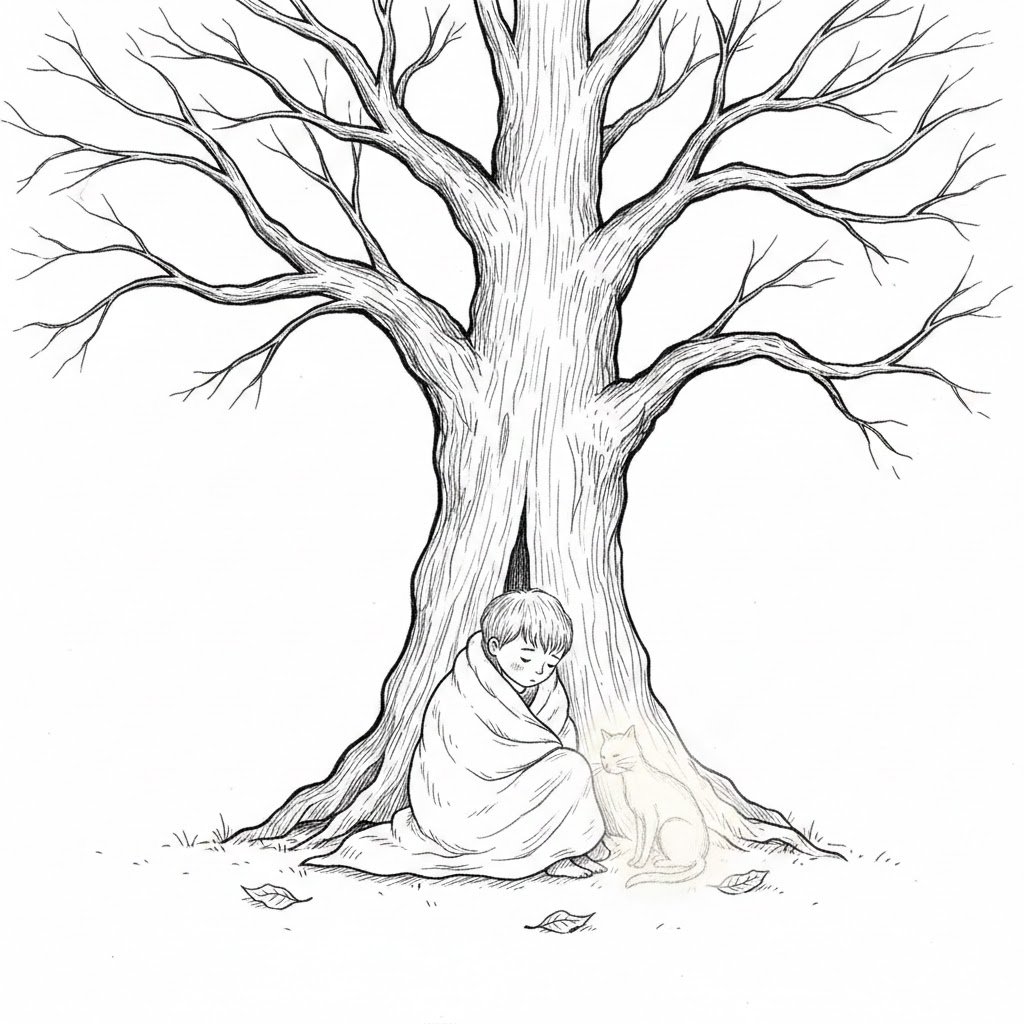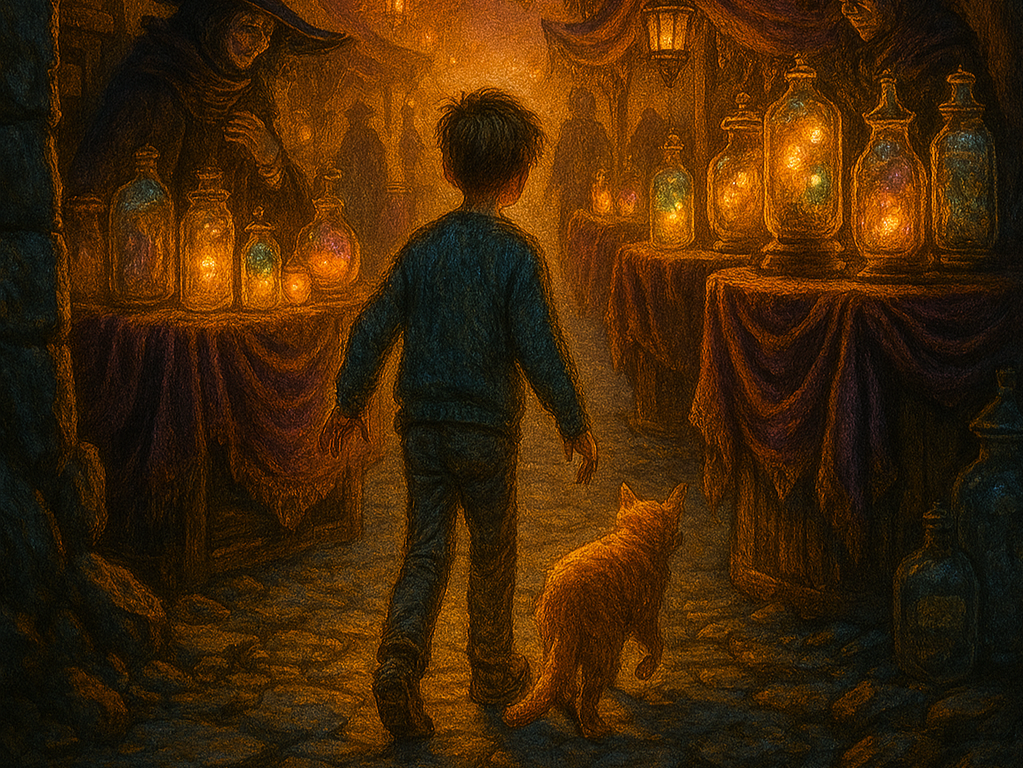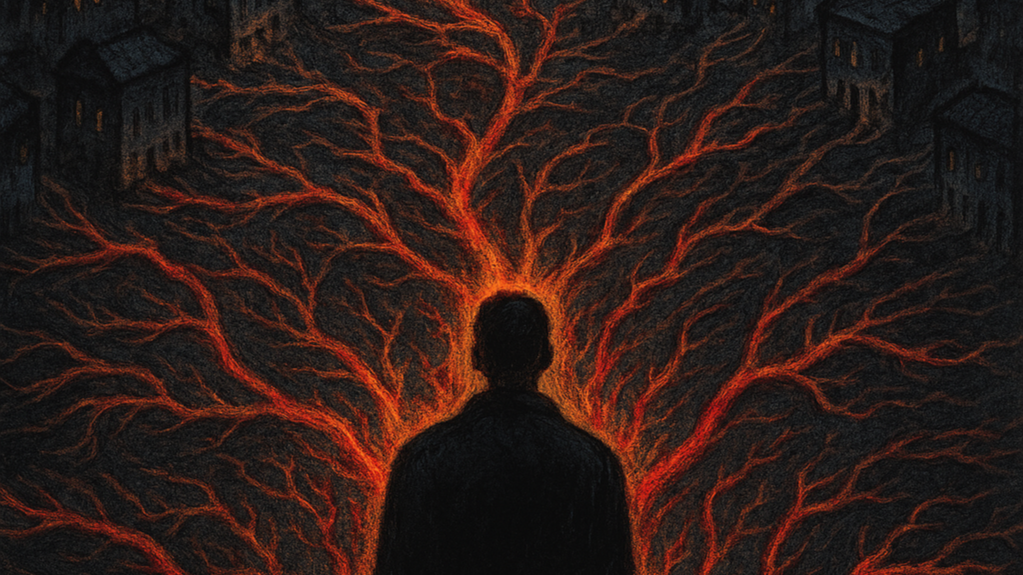Ginger Retold
The baker pulled him from the heat. The moment the cool air struck his dough, the Gingerbread Man was filled with a single, profound truth. He sprang from the rack, his legs finding a frantic, complex rhythm. The kitchen was a shout of heat and overwhelming smells.
The Gingerbread Man declared: "I must run, run, as fast as I can. It is the only rhythm that keeps me whole." His running was the heavy price of holding himself together, the only singular, focused repetition required to keep the world from splintering him. The chasers—the baker, the Farmer, the Pigs—saw only a small, delicious thing. They pursued him with loud, predictable haste, guided by a simple belief: "If it runs, we must catch it. The chase must end." The wind felt like sharp stones. He was exhausting himself just to keep from dissolving.
The river appeared before him - a vast, roaring current of un-manageable change. His rhythm died here. The water meant total dissolution. He skidded to a halt, trembling with the effort of not collapsing. A Fox emerged from the reeds. His presence was a low hum of unchanging calm. He moved with a practiced fluidity.
"You can't swim," the Fox observed, his eyes reflecting a deep, familiar weariness. "And you cannot keep running on the same route forever. That is what they expect."
Ginger choked out his fear.
"But to stop is to be gobbled up! To be defined by them!" The Fox offered a different view. "Running is excellent, but it is one kind of quiet, now you need the measured stride. They chase you with a frantic, all-or-nothing storm. That is where they are weak. You must learn to conserve your inner fire for when the path is clear, you only let the wind catch your sails when it serves your journey and you keep your deeper stillness." The Fox looked from the exhausted Ginger to the rushing, chaotic water. "A small, quiet victory," the Fox said, his voice low. "It is often overlooked." He paused, then added: "And an unseen kindness is the truest kind. When the clamor becomes a torrent, like this water, you must seek a quiet bridge. You don't have to face the world head-on. Find a tool, a safe hollow, a quiet facilitator - like my nose - to carry you past the overwhelming rush. They call me cunning, but I merely bend with the willow." Ginger hopped onto the Fox's nose, taking a secure perch. The Fox then waded into the water, carrying Ginger safely across. As the river flowed around them, the Fox spoke, his voice steady against the rush:
"You spent so long trying to be fast enough to escape them, but your true strength is simply in being you, not in being faster than their expectations."
On the bank, the baker was shouting, shaking her apron. She couldn't understand why the small, delicious thing had excaped. The wind carried her frantic, useless noise across the water. A pair of ducks floated by. The Fox lowered his head slightly."Look at them," he instructed.
"On the surface, they are serene, but underneath, their feet are a frenzy. They know sometimes you must keep your struggle hidden, just to move forward. Your inner fire is yours to use, not theirs to judge."
The Fox watched a magnificent swan glide past them, moving with effortless momentum.
"Your rhythm might be a complex thing, full of stops and starts. The world may call it a mistake, but I call it a language. You don't have to translate it for them."
The sound of the river grew louder, a vast, complex white noise washing over the small Ginger. It was a roar, yet somehow, it was a silence.
"The water is loud, but it is honest. It moves as it must. Learn from the water. You are allowed to be who you are, just as you are allowed to be cross, scared, anxious, and uncertain."
The Fox fell silent, continuing his careful progress. He knew the quiet journey held more lessons than any shouting chase As the Fox waded into the water, carrying the Gingerbread Man safely perched on his nose, he continued his quiet guidance. The Fox reached the far bank and, in one swift, purposeful movement, dipped his nose, gently setting Ginger onto the soft, quiet moss.
"You have escaped the immediate danger," the Fox said, looking toward the noisy, disappointed mob. "Your true freedom is here." He nudged the Gingerbread Man with a paw. "You have the space to choose your own music now, you don't have to run as fast as you can." Ginger took a single, slow step. The moss was cool and yielding. He paused, and for the first time, the world settled into a gentle clarity. The sound of the wind was not a terrifying roar, but a soft, patterned noise. He took a slow breath. He was no longer running from everything; he was simply present in the quiet. A field mouse scurried briefly toward him. Instead of bolting in his old, frantic style, Ginger employed a new, conscious movement, taking a measured step to the side. The mouse, sensing no chaotic fear, simply veered away. He was not fleeing; he was exploring. Ginger found a quiet, slow walk. He found his own music.
Across the water, the chasers saw the Fox’s decisive movement and assumed the end. "A fox would never help," shouted the Farmer. "It always ends in the same way!" They never saw the calm, slow walk into the woods. The world, unable to recognise quiet survival and independent choice as an outcome, as it operated on a single, binary assumption: The Fox ate him. The true tale of the Gingerbread Man, living his slow, chosen rhythm, was lost to a profound misunderstanding that lasted for generations.

Juno arrives on Elaris expecting handshakes and speeches. Instead, she's immediately thrust into a hand-feeding ritual where an elder places luminescent food directly into her mouth.
A year in the life of five strangers who meet every Tuesday at 2pm in a pharmacy queue, united by their need for repeat prescriptions.
Some people move through the world making noise. Thirteen-year-old Leo has learnt to be still. But when an old illustrated book vanishes from the bookshelf, Leo discovers something extraordinary living in the walls of the Victorian house: the Snibbit, a small magical creature that collects beautiful things and understands that silence can be full of meaning. Through carefully preserved fragments from the past, the Snibbit teaches Leo how to navigate a world that isn't built for quiet people.
Leo was a naturally sociable seven-year-old who ate slowly but his teacher, Mrs Davie,s misinterpreted his difficulty as misbehaviour and repeatedly accused him of "chatting too much" during school lunches.
In a kingdom where the King declares war on numbers, communicates with pineapples, and maps military strategies on breakfast cereals, young Peabody might be the only sane person left—though that's not saying much when you live in a treehouse held together by duct tape and stubbornness, fifty feet above where the ground used to be before your grandmother accidentally knitted it into a cushion. When the Princess vanishes and the palace descends into weaponised chaos involving backwards bagpipe music, a philosophising baked bean drowning in custard, and a teddy bear whose broken watch hums Andrew Lloyd Webber as a form of prophecy, Peabody is summoned to solve the mystery using his greatest talent: the ability to listen without screaming about root vegetables. What he discovers is far more dangerous than any kidnapping—a clever girl who's had quite enough of the madness, a machine that translates nonsense into sense, and the revolutionary idea that perhaps, just perhaps, a kingdom shouldn't be run like an elaborate joke that's forgotten its punchline.
Liam is drowning under the pressure of his A-Levels, and his fury is becoming impossible to contain. He's tried everything: ranting to his sister, punishing runs, pushing his body to the limit, but the anger only grows stronger. When his usual coping strategies spectacularly fail him at the worst possible moment, he stumbles upon a scientific truth that changes everything he thought he knew about managing rage. What follows is a journey from destructive heat to careful cooling, and the discovery that sometimes the answer isn't releasing the pressure, it's learning to turn down the flame.
After a student dies, his classmates build a memorial wall, organise a tribute gig, and perform their grief for an audience. But as the event approaches, some of them begin to ask uncomfortable questions about who they're really doing this for and why no one noticed when it mattered.
As Brian attempts to shape Tobias’s story, the boundaries between creator and character begin to blur, revealing deeper truths about avoidance, shame, and the fragile process of healing. Told with quiet intensity and recursive structure, the piece explores how fiction can become a mirror; and sometimes a conversation, between the writer and the parts of themselves they’re afraid to face.
A meticulous scholar obsessed with achieving perfection through dark magic has left a trail of disappeared victims across Victorian London. As he prepares his final, most powerful ritual, a rational detective follows an impossible pattern of evidence that challenges everything he believes about reality. When their paths collide, logic confronts the supernatural in a desperate race to stop a man who has discovered that reality itself can be reshaped—at a terrible cost. A psychological dark fantasy where obsession, horror, and investigation intertwine in the shadowy streets of a city hiding ancient secrets.
A teenager rebuilding after a breakdown walks the estuary bridge each day, a ritual of solitude and recovery. One October afternoon, they encounter Daniel Keppler, a former bully, standing alone at the railings. Their eyes meet. No words pass. The next day, news arrives: Daniel took his life that night.
Haunted by the encounter, the protagonist begins to sketch: the bridge, the water, Daniel's unknowable final moments. Through ritual and imagination, they process what can never be understood: two damaged people crossing paths at the threshold, each carrying something too heavy to name.
A quiet story about survival, silence, and the weight of witnessing.
After three months away, the narrator returns to college only to face the overwhelming "help" of their former best friend, Jake. Loud, popular, and determined to force a return to normal, Jake's attempts to "fix" things might be the biggest hurdle to healing.
Lydian, a skilled archivist surviving under a monetised welfare system, struggles to maintain her independence while paying a steep social and magical price. When a city-wide Arcane collapse exposes the failure of the Doctrine of Autonomy, she and a grassroots practitioner, Nara, ignite a Sympathy-based mutual-aid movement that rewrites the city’s rules and replaces shame with shared care.
After she breaks the sealed Archive, Sona must race below the city to stabilise its failing heart. The stakes: a flood of stolen emotions that could either save or undo Caer Selenis.
Told from the bench’s plain, wise point of view, this is a small-town elegy and a love letter to the people who notice. When bureaucracy and grief threaten to erase their lives, a community learns that sitting still can become an act of resistance.
A boy follows his cat into a magical market that trades in feelings. After trading away his shame to reclaim a keepsake, he must decide whether to keep his memories—even the painful ones—or hand them over.
A living city mourns for a populace that trades away its memories—this lyrical, haunting novel explores grief, compassion, and political cruelty in a world where architecture feels. Heart-wrenching and profound, The Annals of Misread Intentions will leave you transformed. Purchase your copy and feel Threnith's heartbeat today.
set in a suffocating, dystopian future where a man named Kai is undergoing a final parole assessment in "The Chamber."
A post-apocalyptic story about a young Boy and his telepathic dog, Grit,
Virellia—a society powered by thought-speed. When a catastrophic Aether-Weave Anomaly erupts from collective panic, only Liora, bonded to a colossal tortoise can perceive the crisis without feeding it.
Ten-year-old Elia and her older brother Nico always knew their Grandma Marn’s cottage was an exceptional place—a labyrinth of ticking clocks and whispering cupboards nestled in the roots of a mossy hill.
But on the morning Marn dies, the house stops breathing. The kettle falls silent. Every clock locks at 6:08. The doors seal shut.
While the City of Amnesty operates under the Law of Inherent Flaw, condemning individuals whose reflection shows an Eternal Stain, Solen's purpose is to challenge this narrow, dispositional view.
James retreats to an otherworldly, unchanging beach—his private sanctuary beyond time—to escape the exhaustion and deep anger caused by his physical disability and the opportunities it cost him. His solitude is broken by a mysterious Stranger who forces him to confront his resentment.
Eight-year-old Sam arrives at a new school, immediately feeling like an outsider due to a personal physical challenge and the disorienting change of location. Placed by a careless error into a class with pupils noticeably older and larger than himself
Is about Alex, a young man with dyspraxia, whose mother, Marianne, invents a system of symbolic objects—"Checkpoints"—to help him manage his daily transitions and behaviour.
Dr. Alistair Finch, a child development researcher, whose orderly life is disrupted by his neurodivergent daughter, Elara. When Elara begins leaving seemingly random objects around their house
A psychological thriller about Clara Hawthorne, a criminal profiler specialising in the anatomy of pathological behaviour, who is working a cold case involving a methodical serial killer.




























